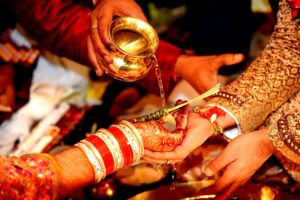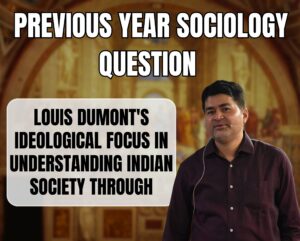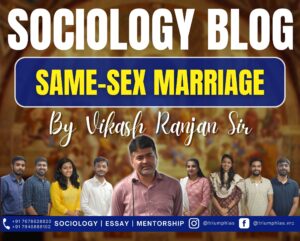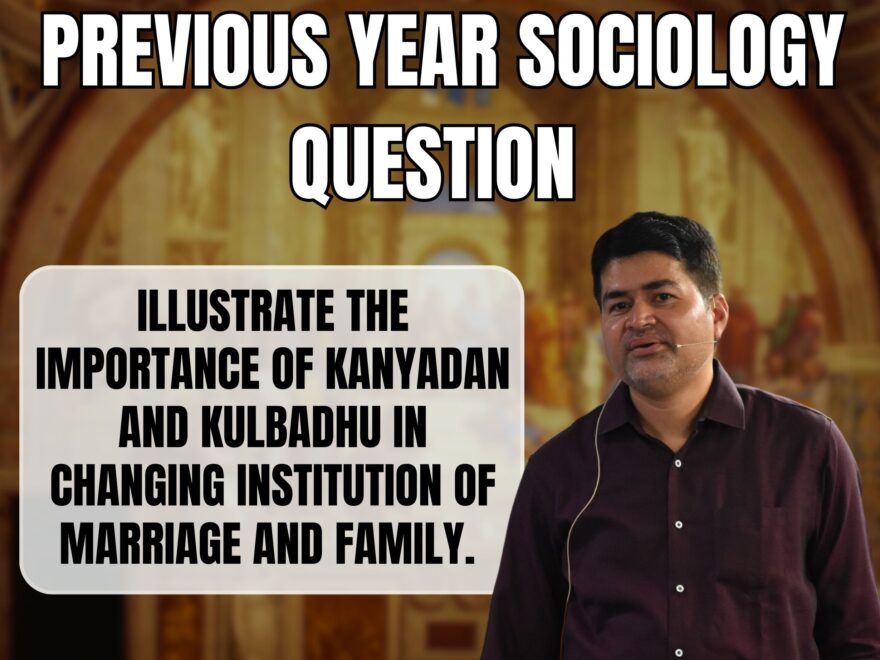Illustrate the Importance of Kanyadan and Kulbadhu in Changing Institutions of Marriage and Family.
Section: A
Sociology Paper 2018
Paper 1: Unit-9 System of Kinship
Paper 2: Unit 13: Indian Society: Structure and Change; Systems of Kinship in India)

Question: Illustrate the importance of Kanyadan and Kulbadhu in changing institution of marriage and family.
(10 Marks)
|
Introduction: Brief About Kanyadaan And Kulvadhu Main Body: Changes in Significance of Kanyadaan And Kulvadhu with Change in Family and Marriage Conclusion: Importance of Studying these Institutions to Understand the Intricate Relationship Between Tradition and Modernity |
Introduction
- Kanyadaan is the ritual where a father symbolically gives his daughter to the groom during a Hindu wedding. It signifies the transition of a woman’s marital status and responsibilities from her natal family to her husband’s. Kanyadaan emphasized patrilineal descent and the importance of male lineage continuation.
- Kulavadhu refers to the ideal daughter-in-law in certain Indian communities. Traditionally, it emphasizes qualities like obedience, submissiveness, and devotion to the husband’s family. This practice is deeply entrenched in patrilineal and patriarchal norms, prioritizing women’s commitment to their marital families.
Main Body
The changes in marriage and family and its impact on significance of kanyadaan and Kulvadhu
- Patricia Uberoi’s research reveals the intricate interplay between tradition and modernity in Kanyadaan. It can be viewed as a patriarchal custom reinforcing gender roles. However as the significance of marriage is changing and couple enters into marriage as equals has made this ritual mere custom and reduced the significance.
- The concept of kanyadaan also highlights the detachment of girl from patrilineal property and lineage. But rise in legal rational authority has overcome this aspect too as now female children are equal in inheritance rights.
- Leela Dube analyze Kulavadhu in the context of women’s roles and identities within families. It perpetuates unequal power dynamics within marriages and contributes to women’s subordination. However as India undergoes social and economic transformations, women’s roles and expectations within families are shifting. Many women now pursue education, careers, and personal aspirations alongside their roles as wives and daughters-in-law.
- With advent of rise in nuclear families and symmetrical marriages the idealised role of kulvadhu has lost its significance.
- Apart from it the ascribed authority of kulvadhu also deciling as now respect in family is associated with achievement status.
- Rise in neo local families has changed the dynamics in family and marriage and attached value of these rituals and institutions is also modifying.
- Increase in divorces, re- marriages And court marriage along with inter caste , inter faith marriage has lost the even ritual significance of these institutions.
- And new dimensions of family like Same Sex Couple, Sologamy , Live In Relations have almost no significance of Kanyadaan And Kulvadhu.
Apart from these changes, however there are some aspects of continuity of significance of such tradition can be seen
-
- In rise in dowry as a security of women due to Kanyadaan still holding relevance as dowry is considered as compensation for leaving the right in patrilineal property .
- Similarly the concept of Kulvadhu might be declining but there is still larger responsibility of expressive role is on women which are leading to double shift of women.
Conclusion
Veena Das emphasize the importance of recognizing and respecting women’s agency in navigating these rituals and negotiating their positions within changing family contexts. Kanyadaan and Kulavadhu exemplify the intricate relationship between tradition and modernity within the evolving institution of marriage and family in India. These practices have adapted over time, mirroring broader shifts in societal norms, gender dynamics, and the agency of women.
Related Blogs …
 |
 |

To master these intricacies and fare well in the Sociology Optional Syllabus, aspiring sociologists might benefit from guidance by the Best Sociology Optional Teacher and participation in the Best Sociology Optional Coaching. These avenues provide comprehensive assistance, ensuring a solid understanding of sociology’s diverse methodologies and techniques.
META TAGS:
Kanyadaan, Kulavadhu, Indian marriage, tradition, modernity, gender roles, family dynamics, social change, women’s agency, patriarchy, inheritance rights, nuclear families, expressive role, patrilineal descent, neo-local families, symmetrical marriages, Patricia Uberoi, Leela Dube, Veena Das
Why Vikash Ranjan’s Classes for Sociology?
Proper guidance and assistance are required to learn the skill of interlinking current happenings with the conventional topics. VIKASH RANJAN SIR at TRIUMPH IAS guides students according to the Recent Trends of UPSC, making him the Best Sociology Teacher for Sociology Optional UPSC.
At Triumph IAS, the Best Sociology Optional Coaching platform, we not only provide the best study material and applied classes for Sociology for IAS but also conduct regular assignments and class tests to assess candidates’ writing skills and understanding of the subject.
Choose The Best Sociology Optional Teacher for IAS Preparation?
At the beginning of the journey for Civil Services Examination preparation, many students face a pivotal decision – selecting their optional subject. Questions such as “which optional subject is the best?” and “which optional subject is the most scoring?” frequently come to mind. Choosing the right optional subject, like choosing the best sociology optional teacher, is a subjective yet vital step that requires a thoughtful decision based on facts. A misstep in this crucial decision can indeed prove disastrous.
Ever since the exam pattern was revamped in 2013, the UPSC has eliminated the need for a second optional subject. Now, candidates have to choose only one optional subject for the UPSC Mains, which has two papers of 250 marks each. One of the compelling choices for many has been the sociology optional. However, it’s strongly advised to decide on your optional subject for mains well ahead of time to get sufficient time to complete the syllabus. After all, most students score similarly in General Studies Papers; it’s the score in the optional subject & essay that contributes significantly to the final selection.
“A sound strategy does not rely solely on the popular
Opinion of toppers or famous YouTubers cum teachers.”
It requires understanding one’s ability, interest, and the relevance of the subject, not just for the exam but also for life in general. Hence, when selecting the best sociology teacher, one must consider the usefulness of sociology optional coaching in General Studies, Essay, and Personality Test.
The choice of the optional subject should be based on objective criteria, such as the nature, scope, and size of the syllabus, uniformity and stability in the question pattern, relevance of the syllabic content in daily life in society, and the availability of study material and guidance. For example, choosing the best sociology optional coaching can ensure access to top-quality study materials and experienced teachers. Always remember, the approach of the UPSC optional subject differs from your academic studies of subjects. Therefore, before settling for sociology optional, you need to analyze the syllabus, previous years’ pattern, subject requirements (be it ideal, visionary, numerical, conceptual theoretical), and your comfort level with the subject.
This decision marks a critical point in your UPSC – CSE journey, potentially determining your success in a career in IAS/Civil Services. Therefore, it’s crucial to choose wisely, whether it’s the optional subject or the best sociology optional teacher. Always base your decision on accurate facts, and never let your emotional biases guide your choices. After all, the search for the best sociology optional coaching is about finding the perfect fit for your unique academic needs and aspirations.
Follow us :
🔎 https://www.instagram.com/triumphias
🔎https://www.youtube.com/c/TriumphIAS
https://t.me/VikashRanjanSociology
Find More Blogs
|
Scope of the subject and comparison with other social sciences |
|||
|
|
|
|
Modernity and social changes in Europe |

